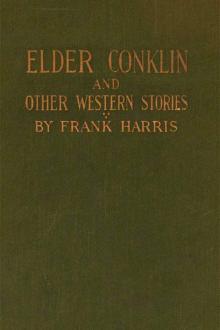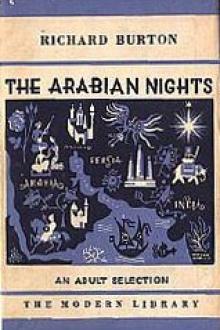Elder Conklin - Frank Harris (i am malala young readers edition .TXT) 📗

- Author: Frank Harris
- Performer: -
Book online «Elder Conklin - Frank Harris (i am malala young readers edition .TXT) 📗». Author Frank Harris
“Oh, pshaw!” broke in Mrs. Hooper irritably, twining her fingers and tapping the carpet with her foot, “Mr. Letgood doesn’t want to leave Kansas City. Don’t you understand? Perhaps he likes the folk here just as well as any in Chicago.” No words could describe the glance which accompanied this. It was appealing, and coquettish, and triumphant, and the whole battery was directed full on Mr. Letgood, who had by this time recovered his self-possession.
“Of course,” he said, turning to the Deacon and overlooking Mrs. Hooper’s appeal, “I know all that, and I don’t deny that the ‘call’ at first seemed to draw me.” Here his voice dropped as if he were speaking to himself: “It offers a wider and a higher sphere of work, but there’s work, too, to be done here, and I don’t know that the extra salary ought to tempt me. Take neither scrip nor money in your purse,” and he smiled, “you know.”
“Yes,” said the Deacon, his eyes narrowing as if amazement were giving place to a new emotion; “yes, but that ain’t meant quite literally, I reckon. Still, it’s fer you to judge. But ef you refuse ten thousand dollars a year, why, there are mighty few who would, and that’s all I’ve got to say—mighty few,” he added emphatically, and stood up as if to shake off the burden of a new and, therefore, unwelcome thought.
When the minister also rose, the physical contrast between the two men became significant. Mr. Letgood’s heavy frame, due to self-indulgence or to laziness, might have been taken as a characteristic product of the rich, western prairies, while Deacon Hooper was of the pure Yankee type. His figure was so lank and spare that, though not quite so tall as his visitor, he appeared to be taller. His face was long and angular; the round, clear, blue eyes, the finest feature of it, the narrowness of the forehead the worst. The mouth-corners were drawn down, and the lips hardened to a line by constant compression. No trace of sensuality. How came this man, grey with age, to marry a girl whose appeal to the senses was already so obvious? The eyes and prominent temples of the idealist supplied the answer. Deacon Hooper was a New Englander, trained in the bitterest competition for wealth, and yet the Yankee in him masked a fund of simple, kindly optimism, which showed itself chiefly in his devoted affection for his wife. He had not thought of his age when he married, but of her and her poverty. And possibly he was justified. The snow-garment of winter protects the tender spring wheat.
“It’s late,” Mr. Letgood began slowly, “I must be going home now. I thought you might like to hear the news, as you are my senior Deacon. Your advice seems excellent; I shall weigh the ‘call’ carefully; but”— with a glance at Mrs. Hooper—“I am disposed to refuse it.” No answering look came to him. He went on firmly and with emphasis, “I wish to refuse it.—Good day, Mrs. Hooper, till next Sunday. Good day, Deacon.”
“Good day, Mr. Letgood,” she spoke with a little air of precise courtesy.
“Good day, sir,” replied the Deacon, cordially shaking the proffered hand, while he accompanied his pastor to the street door.
The sun was sinking, and some of the glory of the sunset colouring seemed to be reflected in Deacon Hooper’s face, as he returned to the drawing-room and said with profound conviction:—
“Isabelle, that man’s jest about as good as they make them. He’s what I call a real Christian—one that thinks of duty first and himself last. Ef that ain’t a Christian, I’d like to know what is.”
“Yes,” she rejoined meditatively, as she busied herself arranging the chairs and tidying the sofa into its usual stiff primness; “I guess he’s a good man.” And her cheek flushed softly.
“Wall,” he went on warmly, “I reckon we ought to do somethin’ in this. There ain’t no question but he fills the church. Ef we raised the pew-rents we could offer him an increase of salary to stay—I guess that could be done.”
“Oh! don’t do anything,” exclaimed the wife, as if awaking to the significance of this proposal, “anyway not until he has decided. It would look—mean, don’t you think? to offer him somethin’ more to stay.”
“I don’t know but you’re right, Isabelle; I don’t know but you’re right,” repeated her husband thoughtfully. “It’ll look better if he decides before hearin’ from us. There ain’t no harm, though, in thinkin’ the thing over and speakin’ to the other Deacons about it. I’ll kinder find out what they feel.”
“Yes,” she replied mechanically, almost as if she had not heard. “Yes, that’s all right.” And she slowly straightened the cloth on the centre-table, given over again to her reflections.
Mr. Letgood walked home, ate his supper, went to bed and slept that night as only a man does whose nervous system has been exhausted by various and intense emotions. He even said his prayers by rote. And like a child he slept with tightly-clenched fists, for in him, as in the child, the body’s claims were predominant.
When he awoke next morning, the sun was shining in at his bedroom window, and at once his thoughts went back to the scenes and emotions of the day before. An unusual liveliness of memory enabled him to review the very words which Mrs. Hooper had used. He found nothing to regret. He had certainly gained ground by telling her of the call. The torpor which had come upon him the previous evening formed a complete contrast to the blithesome vigour he now enjoyed. He seemed to himself to be a different man, recreated, as it were, and endowed with fresh springs of life. While he lay in the delightful relaxation and warmth of the bed, and looked at the stream of sunshine which flowed across the room, he became confident that all would go right.
“Yes,” he decided, “she cares for me, or she would never have wished me to stay. Even the Deacon helped me—” The irony of the fact shocked him. He would not think of it. He might get a letter from her by two o’clock. With pleasure thrilling through every nerve, he imagined how she would word her confession. For she had yielded to him; he had felt her body move towards him and had seen the surrender in her eyes. While musing thus, passion began to stir in him, and with passion impatience.
“Only half-past six o’clock,” he said to himself, pushing his watch again under the pillow; “eight hours to wait till mail time. Eight endless hours. What a plague!”
His own irritation annoyed him, and he willingly took up again the thread of his amorous reverie: “What a radiant face she has, what fine nervefulness in the slim fingers, what softness in the full throat!” Certain incidents in his youth before he had studied for the ministry came back to him, bringing the blood to his cheeks and making his temples throb. As the recollections grew vivid they became a torment. To regain quiet pulses he forced his mind to dwell upon the details of his “conversion”—his sudden resolve to live a new life and to give himself up to the service of the divine Master. The yoke was not easy; the burden was not light. On the contrary. He remembered innumerable contests with his rebellious flesh, contests in which he was never completely victorious for more than a few days together, but in which, especially during the first heat of the new enthusiasm, he had struggled desperately. Had his efforts been fruitless?…
He thought with pride of his student days—mornings given to books and to dreams of the future, and evenings marked by passionate emotions, new companions reinspiring him continually with fresh ardour. The time spent at college was the best of his life. He had really striven, then, as few strive, to deserve the prize of his high calling. During those years, it seemed to him, he had been all that an earnest Christian should be. He recalled, with satisfaction, the honours he had won in Biblical knowledge and in history, and the more easily gained rewards for rhetoric. It was only natural that he should have been immediately successful as a preacher. How often he had moved his flock to tears! No wonder he had got on.
Those first successes, and the pleasures which they brought with them of gratified vanity, had resulted in turning him from a Christian into an orator. He understood this dimly, but he thrust back the unwelcome truth with the reflection that his triumphs in the pulpit dated from the time when he began consciously to treat preaching as an art. After all, was he not there to win souls to Christ, and had not Christ himself praised the wisdom of the serpent? Then came the change from obscurity and narrow living in the country to Kansas City and luxury. He had been wise in avoiding that girl at Pleasant Hill. He smiled complacently as he thought of her dress, manners, and speech. Yet she was pretty, very pretty, and she had loved him with the exclusiveness of womanhood, but still he had done right. He congratulated himself upon his intuitive knowledge that there were finer girls in the world to be won. He had not fettered himself foolishly through pity or weakness.
During his ten years of life as a student and minister he had been chaste. He had not once fallen into flagrant sin. His fervour of unquestioning faith had saved him at the outset, and, later, habit and prudence. He lingered over his first meeting with Mrs. Hooper. He had not thought much of her then, he remembered, although she had appeared to him to be pretty and perfectly dressed. She had come before him as an embodiment of delicacy and refinement, and her charm had increased, as he began, in spite of himself, to notice her peculiar seductiveness. Recollecting how insensibly the fascination which she exercised over him had grown, and the sudden madness of desire that had forced him to declare his passion, he moaned with vexation. If only she had not been married. What a fatality! How helpless man was, tossed hither and thither by the waves of trivial circumstance!
She had certainly encouraged him; it was her alternate moods of yielding and reserve which had awakened his senses. She had been flattered by his admiration, and had sought to call it forth. But, in the beginning, at least, he had struggled against the temptation. He had prayed for help in the sore combat—how often and how earnestly!—but no help had come. Heaven had been deaf to his entreaties. And he had soon realized that struggling in this instance was of no avail. He loved her; he desired her





Comments (0)